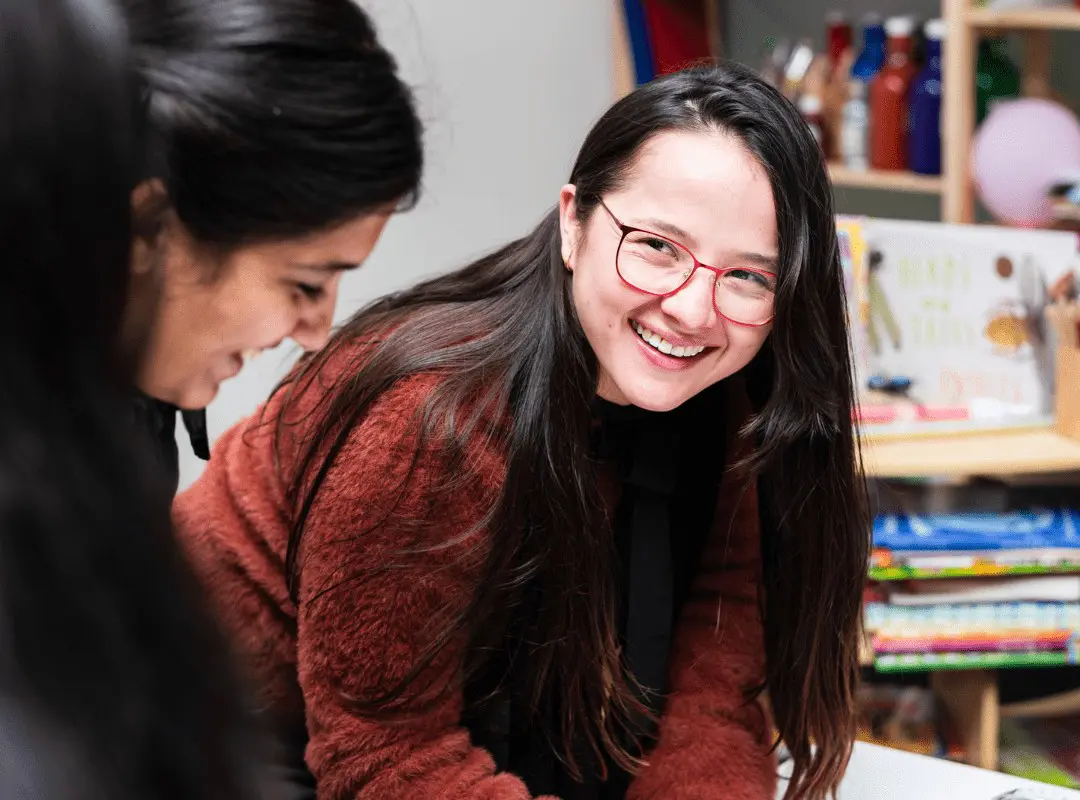Overview
More than a Masters: Your Path to a Rewarding Profession
Are you ready to make a profound impact on the lives of others? Our Master’s Degree in Counselling and Psychotherapy offers a unique blend of advanced knowledge and practical skills to equip you with the ability to become a highly effective counsellor and psychotherapist.
This Masters-level course combines cognitive science, neuroscience and psychotherapy to transform your understanding of the human experience. Through a client-centred lens, you will develop a deep understanding of various therapeutic practices, including psychodynamic, humanistic, somatic, and trauma-informed approaches.
The Master of Counselling and Psychotherapy program will equip you to work ethically with a wide variety of clients in diverse settings, fostering cultural and interpersonal sensitivity.
Gain hands-on experience and hone your therapeutic skills with a 120-hour placement as part of your Masters journey. You will manage your own client case load under expert supervision.
This Masters qualification is FEE-HELP approved for eligible applicants, as well as Youth Allowance (student), Austudy and the Pensioner Education Supplement.
Key Information
| Award | Master of Counselling and Psychotherapy |
| Duration | 2 Years Full Time |
| Study Mode | On Campus Blended Study (Online and Face-to-Face Study) |
| Locations | Adelaide (From T2 onwards) Brisbane (From T2 onwards) Melbourne or Sydney (Intensives) Online |
| Intakes | February, May, September |
| Course Fees | Domestic (FEE-HELP available) International |
Trimester 2, 2026 Applications Now Open
Career Opportunities
This degree will prepare graduates to work as a registered counsellor and psychotherapist in the public, private and community sectors. Upon graduating, you may find career opportunities in:
- Private counselling and psychotherapy practice
- Community and mental health organisations
- Trauma and grief support services
- Family and relationship support agencies
- Addiction support agencies
- Correctional services
- Welfare agencies
You may also integrate your knowledge and skills into roles in education, health, social services and business.
Professional Recognition
This course is accredited by the Australian Counselling Association (ACA). Graduates will be eligible for Level 2 membership with ACA.

Course Structure
Delivery & Workload
A typical full-time load is 8 subjects per year across 3 trimesters. Variations to study load will be considered on a case-by-case basis, however, the maximum number of subjects a student can take under an accelerated (fast-track) load is 4 subjects per trimester.
Course delivery for the Master of Counselling and Psychotherapy is a combination of lectures, tutorials, discussions, assessment activities and independent study.
You should allow a notional 12 hours per week for each subject studied. You should then spend approximately 26 hours per week for self-directed study to complete prescribed readings, practice skills, research, study and complete assessments.
Study Modes
Ikon offers on-campus and blended study options for students who enroll into the Master of Counselling and Psychotherapy.
Blended study includes an online component as well as face-to-face intensives.
The online delivery component involves live online sessions where students engage with lecturers and peers in real-time interactions, closely simulating the dynamics of on-campus learning.
Students enrolled in online distance learning are required to complete three subjects that include both weekly online classes and a compulsory on-campus intensive:
- COU502 Foundations of Therapeutic Practice
- COU508 Process Experiential Psychotherapy
- COU512 Conversational Model of Psychotherapy
Each subject includes:
- Weekly online learning: 1.5-hour classes held over 10 weeks during the trimester.
- On-campus intensive: an 18-hour face-to-face session delivered over three consecutive days (Friday–Sunday) at our Melbourne or Sydney campus.
As a result, students will attend three separate on-campus intensives in total (one for each of the above subjects) across the duration of the program.
These intensives will provide students with hands-on skills practice, supervised clinical simulations, and valuable interactions in a face-to-face learning environment.
Subjects
The Master of Counselling and Psychotherapy comprises 16 equally weighted subjects of 6 credit points each (total of 96 credit points) delivered over 1.5 or 2 years (depending on admission pathway). The course also includes 1 supervised placement subject totaling 120 hours.
Subjects
Year 1
Year 2
This subject examines the major paradigms in counselling and psychotherapy, and their theories of therapeutic change. Students will study models from the psychodynamic, humanistic, cognitive-behavioural, constructivist postmodern and transpersonal approaches, examining their underlying theories, therapeutic processes, and techniques. A core focus is the examination of the mechanisms of change within each approach. Students will examine the common factors that underpin effective therapeutic practice while recognising the unique aspects of each approach to facilitate change. In evaluating the strengths and limitations of different therapeutic approaches, students will gain a nuanced understanding of their applicability and limitations in different and diverse contexts.
The subject also explores the integration of different approaches, fostering an appreciation for the potential synergies and challenges that arise from an integrated therapeutic framework. Additionally, students will embark on a journey of self-reflection as they start to develop their own personal approach to counselling and psychotherapy practice, anchored in their unique strengths, values, and therapeutic philosophy.
Subject Code: COU501
Credit Points: 6
Assessments: Online Quiz (30%), Critical Comparison Essay (40%), Reflective Essay (30%)
This subject is designed to develop the skills needed to build a strong therapeutic relationship with clients, apply self-reflective and client-centred practice, and the use of more advanced counselling skills to facilitate change. Through observation, imitation of master practitioners, practice in triads, debriefing and reflecting on practice students will learn to facilitate fundamental counselling skills as well as advanced empathy, attunement, therapeutic presence and the application of other advanced counselling skills.
The relationship between different counselling theories and skills will also be discussed. Students are guided to explore therapeutic presence and engagement as a foundation for their work. The difference between the therapeutic relationship with ‘relational depth’ and the ‘therapeutic alliance’ will also be explored. The central activity is the experiential practice of therapeutic skills in one-to-one therapeutic interactions with lecturers and peers where students will share and work with their own ‘lived experience’ in sessions. At successful completion of this subject, students will have gained a suite of holistic counselling skills to facilitate supportive counselling and a strong foundation for the specialised practice skills that follow in the Graduate Diploma and Masters Degree.
Subject Code: COU502
Credit Points: 6
Assessments: Triad Participation & Skills Demonstration (30%), Skills Demonstration & Self-Evaluation (50%), Peer Observation & Reflection (20%)
This subject is designed to foster awareness and understanding of ethical issues fundamental to ethical and culturally sensitive counselling practice. Students will gain knowledge of the principles, frameworks and approaches that can guide ethical decision making, including legislation and codes of conduct within the Australian professional landscape.
The subject emphasises the importance of understanding ethical principles from a range of philosophical positions, such as relational ethics, ethics of caring, and virtue-based ethics. Students will be challenged to integrate these ethical principles with codes of ethics to address ethical dilemmas. Students will also acquire the skills to apply ethical principles, codes, and frameworks to propose ethical and culturally sensitive solutions to common scenarios encountered in clinical practice, using contemporary case scenarios as a basis for analysis. The subject also encourages critical reflection on the connections and potential tensions between their own personal and professional values and how these may influence their behaviour, practice and decision making.
Subject Code: COU503
Credit Points: 6
Assessments: Case Scenario Logbook (30%), Case Analysis Report (40%), Reflective Essay (30%)
This subject offers an advanced exploration of human development across the lifespan through the developmental perspective. Grounded in developmental theories, contemporary research, and the developmental stages from prenatal to late adulthood, students will examine the biological, familial, psychosocial, and environmental factors that shape optimal human functioning. Central to this exploration is the application of this knowledge to therapeutic practice, ensuring that students can draw upon these insights in real-world settings to foster resilience and facilitate personal growth in their clients. Beyond theoretical understanding, students will engage in self-reflection to comprehend the impact of their own developmental journey on both their personal growth and their professional practice.
Subject Code: COU504
Credit Points: 6
Assessments: Academic Poster (30%), Case Analysis Essay (40%), Reflective Essay (30%)
This subject is an exploration of the complexities of mental health and wellbeing. It examines the core concepts of mental health, and different theoretical perspectives of mental health conditions, assessment processes, diagnostic systems, and treatments. Students will learn to identify and interpret the indications of common mental health presentations, enhancing their ability to effectively engage with multidisciplinary mental health teams.
The subject emphasises the evaluation of evidence-based treatment approaches, and critical analysis of the diagnostic systems approach and the sociopolitical influences on mental health care. Myths and stigma associated to mental health are examined, exploring the influence of cultural perceptions on shaping mental health experiences and the integration of Indigenous healing principles in modern mental health care. This reflective exploration of mental health equips students to better understand client experiences and challenges, enriching their professional practice and enhancing their empathic capacities.
Subject Code: COU505
Credit Points: 6
Assessments: Online Examination (20%), Group Digital Presentation (40%), Case Study Analysis (40%)
This subject introduces students to research and theory in the study of emotion, affectivity, and the development of self. Students will study how emotions play a crucial role in shaping one’s identity and self-concept. Students will consider the role that emotion and affect has in the development towards a fully functioning person and how faulty unconscious emotion processing can interfere with the development of the self.
The focus of the subject will be an exploration of historical aspects, neurodevelopmental perspectives, contemporary emotion theory, emotion schematic memory structures, the development of social emotions, emotion regulation and psychopathologies in emotional development. Students will examine the development of internal working models, which serve as underlying mechanisms for behavioural patterns. They will also gain insight into how psychotherapists identify and address emotions and affective states. Additionally, students will explore psychotherapeutic approaches that aim to address emotional experience and emotion processing difficulties with the goal of facilitating therapeutic change.
Subject Code: COU506
Credit Points: 6
Assessments: Tree Diagram (25%), Case Analysis Report (30%), Critical Analysis Essay (45%)
This subject plays a central role in the course, serving as the integrative hub that connects the diverse perspectives of philosophy, cognitive science, phenomenology, neuroscience, and psychotherapy. It offers an interdisciplinary exploration of the intricate concept of the mind, providing students with a nuanced understanding of the nature of mind and its pivotal role in human cognition, consciousness, and behaviour. As students dissect topics ranging from embodied minds and the intricacies of perception to information processing, intentionality, and self-awareness, the subject lays the groundwork for navigating the complexities in mental health. Through a thoughtful exploration of theories and therapeutic approaches, students will further their knowledge and clinical skills to guide clients toward positive transformation and enhanced mental wellbeing. The subject serves as an essential bridge between theory and practice, supporting students throughout their learning journey in this course.
Subject Code: COU507
Credit Points: 6
Assessments: Annotated Bibliography (30%), Case Analysis Report (40%), Integrative Reflection Essay (30%)
This subject introduces an advanced approach to therapy that focuses on a person’s inner experiences, thoughts, and emotions. The subject highlights the principle that deeper levels of inner experiencing and emotion processing pave the way for cognitive processing.
Students will experience how thought and emotion and inner experience work in tandem in the process of change, human growth and problem-solving. Through observation and practical triad work, students will apply the experiencing scale to identify levels of inner experience. They will also apply techniques that help clients to increase their access to self-compassion and personal agency by exploring their immediate feelings, identifying core emotions, and dealing with unresolved, unexpressed, and difficult emotion. Students will be introduced to experiential tools such as multiple chairs and imagery to allow clients to work with inner experience. Therapeutic techniques to recognise and understand personal narratives will also be explored, including identifying unproductive stories, and recurring patterns, and bringing these stories into the present. At the completion of this subject, students will have acquired essential knowledge and skills for working holistically with a client.
Subject Code: COU508
Credit Points: 6
Assessments: Case Study Analysis Report (20%), Annotated Transcript Analysis (45%), Academic Essay (35%)
This subject explores how the structure, function and process of the brain can support both counsellors and psychotherapists in their clinical practice. Students are introduced to neuroanatomy, brain development, brain structure, and its functions. Students will develop a proficient understanding of memory systems, memory formation, memory process from birth to adulthood and the impact of trauma on developing neural systems. The subject will also review neural corelates of certain mental health difficulties along with research into neuroscientific explanations of important therapeutic process such as empathy, attunement, transference and countertransference. Finally, students will learn how psychotherapy facilitates change via activation of existing and facilitating new neural pathways. The subject will also review contemporary developments in neuroscience research and its application to counselling and psychotherapy.
Subject Code: COU509
Credit Points: 6
Assessments: Academic Poster (30%), Case Analysis Report (40%), Essay (30%)
This subject offers an exploration of trauma theory and its practical application for treating complex trauma. From a foundational understanding of trauma theory, students will explore the interplay of neurobiology, attachment dynamics, and trauma responses. Additionally, the subject uniquely incorporates innovative techniques such as polyvagal-informed strategies (Porges), structural dissociation model (Fisher), trauma and recovery model (Herman), mindsight (Siegel) and mentalisation (Fonagy), offering students a diverse toolkit for working with complex trauma. Through a dynamic blend of theory, practice, and reflection, students will engage in a learning experience that merges theory and practice into a powerful force for healing and transformation. This multifaceted approach ensures students are well-prepared to engage effectively and empathically with clients impacted by complex trauma.
Subject Code: COU510
Credit Points: 6
Assessments: Essay (30%), Case Analysis Report (40%), Trauma Therapy Portfolio (30%)
Assessment, case conceptualisation, and treatment planning are essential skills for all mental health practitioners, playing a crucial role in the effectiveness of counselling and psychotherapy processes. Assessment serves as the compass guiding the therapeutic journey, enabling practitioners to navigate the complexities of a case presentation. The subject begins by examining assessment techniques and the collection of client information, and then explores the intricacies of case conceptualisation and the creation of comprehensive treatment plans, tailored to address the unique needs and goals of clients. Students will synthesise case conceptualisation through and within different theoretical perspectives, including humanistic, psychodynamic, cognitive-behavioural therapy, and metacognitive therapy, applying these concepts to clinical cases and engaging in integrated multimodal approaches, ensuring holistic and evidence-based practice.
Subject Code: COU511
Credit Points: 6
Assessments: Case Conceptualisation and Treatment Plan (30%), Case Analysis Report (40%), Essay (30%)
This subject introduces students to the Conversational Model of psychoanalytical psychotherapy, which is based on an understanding of the development of self. Students are introduced to the core principles of the model, namely as the concept of self, the development of self through the intersubjective exchange between infant and primary caregiver, the importance of language in early life, and symbolic play as part of personal development. Students will develop sensitive therapy skills to respond harmoniously, like an attuned infant-care giver, to the client’s distinctive experiences. This will be achieved by learning how to attend to embodied and felt experiences within the therapeutic space, and connect using resonating language and empathic responses.
Subject Code: COU512
Credit Points: 6
Assessments: Essay (30%), Clinical Demonstration and Transcript (30%), Critical Self-Analysis Essay (40%)
The intricate relationship between mind and body plays a pivotal role in trauma therapy practice, offering valuable insights for therapeutic interventions. This subject equips students with a deep understanding of psychobiological nuances and practical skills for integrating body-based interventions. Grounded in the pioneering works of Pat Ogden, Peter Levine, Babette Rothschild, and Ross Rosenberg, the curriculum explores innovative somatic techniques and their applications in trauma psychotherapy. Through case studies, students will understand the many ways trauma manifests and the potential for somatic interventions to facilitate healing. Beyond theory, students will practice applying diverse somatic strategies through triad work, ensuring tailored and culturally sensitive approaches in their professional practice. This exploration prepares students to confidently bridge theory and practice, leading to transformative outcomes.
Subject Code: COU513
Credit Points: 6
Assessments: Written Report (30%), Group Digital Presentation (30%), Clinical Skills Examination (40%)
This subject explores therapeutic work with individuals facing complex challenges such as co-occurring conditions, addictions, resistance to therapy, navigating a post-truth world marked by misinformation and a blurring of facts, and the emotional distress of eco-anxiety. Through experiential learning, students will build on their understanding of mental health and psychotherapy practice. Students will enhance their clinical understanding and therapeutic practice by analysing complex presentations through multiple lenses of psychoanalytic, emotion-focused, existential and motivational interviewing approaches. Students will examine the interrelationship between mental health conditions and substance use, the aetiology of addiction, and the rewarding and re-enforcing effects of addictive behaviour. The subject emphasises the importance of self-awareness, the appreciation of diverse life experiences, and fostering therapy that is empathic and supportive of client transformation and growth.
Subject Code: COU514
Credit Points: 6
Assessments: Digital Storytelling Project (30%), Group Digital Presentation (30%), Case Study Treatment Plan (40%)
This subject involves students in the exploration of practitioner inquiry and research design within the fields of counselling and psychotherapy practice. We demystify research into human experiencing, asking “What is research?”, and looking at the related questions, “What do we want to know?”, “What can be known?” and “How can we know it?”. Student learning is centred in the research design process and begins with the fundamental step in a research project, critically examining the existing body of literature on a research topic of interest to identify a research gap and generate a clinically relevant research question. Based on their findings, students will conceptualise and plan a research project and produce a clear and coherent research proposal including the objectives, context and significance, the likely research methodology to investigate the research question, and the ethical considerations. The subject culminates with students being invited to present their research proposal to a review panel at a symposium style event.
Subject Code: COU515
Credit Points: 6
Assessments: Preliminary Research Question Pitch Presentation (20%), Literature Review (40%), Research Proposal & Presentation (40%)
This placement requires the completion of 120 total placement hours consisting of at least 40 hours of direct client contact. The balance of placement hours will consist of indirect practice activities such as analysis of practice, writing case notes and case plans, and preparing case presentations for clinical discussion.
Students are expected to attend placement for 1.5 days per week (≈12 hours per week) and attend weekly 2-hour group supervision in a small group context facilitated by Ikon (maximum 10 participants). Students will also participate in 1 hour of individual workplace supervision for every 4 hours of client contact with their Workplace Supervisor as part of their total placement hours.
Subject Code: COU516
Credit Points: 6
Pre-Requisites: All Subjects (except COU515 Bringing Research to Life) and pass the Clinical Skills Examination in COU514 Bridging Mind, Body and Healing in Trauma

Recognition of Prior Learning
At Ikon, your past studies or work experience can be acknowledged through Recognition of Prior Learning (RPL) or Credit Transfer. RPL evaluates your previous skills and experience against the learning outcomes of Ikon subjects, potentially exempting you from studying certain subjects. Credit Transfer allows your previous studies to contribute towards your qualification, granting credits based on matched content and learning outcomes between equivalent qualifications. These pathways could help you to fast track your qualification, reducing study time and tuition fees. The maximum number of subjects for which credit may be granted is 50% of the total award credit points.
Exit Pathways
Students enrolled into the Master of Counselling and Psychotherapy may exit with a Graduate Certificate in Counselling or Graduate Diploma of Counselling and Psychotherapy if they have successfully completed the subjects listed below.
COU501 Models of Therapeutic Practice
COU502 Foundations of Therapeutic Practice
COU503 Ethics, Diversity and Practice
COU504 Human Development
Exit Point – Graduate Certificate in Counselling
COU505 Understanding Mental Health
COU506 Emotion, Affect and Self in Psychotherapy
COU507 Unravelling the Concept of Mind
COU508 Process Experiential Psychotherapy
Exit Point – Graduate Diploma of Counselling and Psychotherapy
COU509 Neuroscience of Psychotherapy
COU5010 Navigating Healing in Complex Trauma
COU511 From Assessment to Treatment Design
COU512 Conversational Model of Psychotherapy
COU513 Bridging Mind, Body and Healing in Trauma
COU514 Working with Complex Presentations
COU515 Bringing Research to Life
COU516 Applied Professional Practice
Master of Counselling and Psychotherapy

Entry Requirements
We welcome students from all circumstances and academic backgrounds to apply for this course.
Choose the admission pathway that is most relevant to your educational background.
Qualifications & Prior Learning
English Language Proficiency
Additional Admissions Requirements
The course design provides four admission pathways with progression dependent on the applicant’s highest completed prior qualification.
- Admission Pathway 1 (Undergraduate Degree in Any Discipline): Applicants who have successfully completed a Bachelor Degree (or equivalent) in any discipline will commence with the first four subjects that make up the nested Graduate Certificate to obtain the fundamental knowledge and skills that underpins counselling and therapeutic practice.
- Admission Pathway 2 (Undergraduate Degree in Counselling or Psychotherapy): Applicants who have successfully completed a Bachelor Degree in counselling or psychotherapy may be eligible for credit via Advanced Standing for the first four fundamental subjects in the nested Graduate Certificate. Applicants must demonstrate equivalent knowledge and skills acquired through prior learning via detailed mapping and documentary evidence. Eligibility will be based on an assessment of prior learning against discipline equivalence, content, and learning outcomes. Course duration 1.5 years FT.
- Admission Pathway 3 (Specialist Psychotherapy Training): Applicants who have completed non-AQF accredited specialist psychotherapy training at a level and depth equivalent to a Bachelor Degree, such as a PACFA Accredited Specialist Psychotherapy Course, may be eligible for credit via Advanced Standing for the first four subjects in the Graduate Certificate. Admission will be considered on a case-by-case basis and applicants may receive an amended offer to the Graduate Certificate in Counselling.
- Admission Pathway 4 (Professional Experience): Applicants who do not hold a Bachelor Degree but have at least five years FTE experience as a counsellor, psychotherapist or psychoanalyst may be eligible for admission based on their professional experience. Students would commence with the first four fundamental subjects to ensure they have the academic preparation and foundation necessary to succeed in the course. Admission will be considered on a case-by-case basis by the Head of School (or nominee) to determine the applicant’s ability to meet the educational demands of the course.
Applicants with only previous vocational training qualifications, who do not also have ≥5 years FTE professional experience as a counsellor, psychotherapist or psychoanalyst, are not eligible for admission.
Applicants with only recent senior secondary education are not eligible for admission.
Student Admissions Policy
Inherent Requirements
Student Profile
All students need appropriate English language skills to participate and complete the requirements of their course of study. Applicants whose first language is not English must evidence they meet the minimum English proficiency requirements for admission. English proficiency can be evidenced by one of the following:
- Undergraduate degree or postgraduate award where English was the language of instruction; or
- An English language proficiency test achieving an IELTS Academic Overall Score of 6.5 (or equivalent) with Speaking no less than 6.5 and Listening, Writing and Reading no less than 6.0.
Applicants seeking admission based on prior qualifications must provide certified academic transcripts of their completed qualifications, and a completed admission questionnaire.
Applicants seeking admission based on professional experience must provide a curriculum vitae clearly detailing their roles, duties and duration of positions, a statement of service on employer letterhead (or accountant or solicitor if self-employed), and a completed admission questionnaire.
All applicants should read the course inherent requirements to ensure they are able to meet them.
Applicants may be asked to participate in an interview to determine suitability for the program.
Find Out More!
Complete the form below to download our course brochure and find out more about the Master of Counselling and Psychotherapy.

